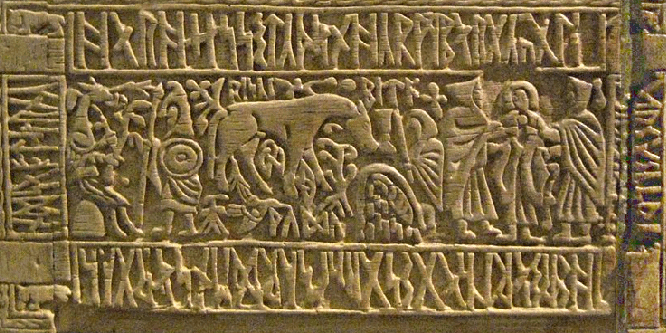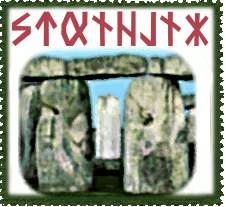5. The mysterious Animals of the Emperors
The gods of ancient Rome didn't really exist,
neither did the gods of the later Christians. But strong magic and
influence was always perceptible especially for important persons. In
ancient Rome such magic would often be linked to a wondrous animal.
Such a super- animal had been the wonder-horse Bucephalus, the horse
of Alexander the puny Great. Also of Julius Caesar the legend came up
that he had been riding such a strange horse. In some cases the Earth
Goddess, who isn't human after all, tried to "appear" like
this. It was due to her spell that Tiberius held a snake as his pet.
But at his time it was God's main objective not to let Rome thrive,
but to stop it's legions from conquering Germania.
Allegedly Caesar's horse had had three hooves on
each leg, instead of the normal one! Some pundits speculated that
this horse must have been of a rare atavistic type. But my goddess
Ewa reminded me of the story that the Romans of Caesar had found in
Africa some few dromedarys. Caesar must have climbed one of these
animals too, who were taken by some of his men as a strange kind of
horses. The Earth Goddess then uses such misunderstandings to
procreate the myths of the good animals at the side of the emperor or
ruler. Sometimes that helps to pave the way from the bad, greedy and
tyrannical Caesars of ancient Rome to her true and good Kaiser.
The Greys too have their ways to show up as
animals. They eventually prefer bad and wild beasts or degenerate
pets. The Greys of the local group always tried to appear as wolves
or dogs. That is why the she-wolf plays such an important role in the
foundation myth of Rome. From that wolf a line of traditions is
leading to the wolf-girl Hel, that plays a dark role in Nordic myths.
According to the Edda it is her role to punish dead souls in the
underworld, in a chamber or lair whose walls are covered with
poisonous snakes. In truth these snakes are only her electrical and
supply cables. But the Greys do their worst to punish and pester
people while they live. To mark the occasion of the coming of Jesus
they were spreading some kind of leprosy in the Roman empire. With
N-rays these evil fishes also typically stimulate guys at the crotch.
But such itching in between the legs is also the consequence of
natural processes. Not all the stars are bad, some send us helpful
E-rays. Another legend of Augustus, the best one of these emperors,
has it that liver marks on his breast formed the constellation of
Ursa Maior, the Big Bear. It's the place where the Humanoids of the
Alliance of Earths live. In their earths also "monsters"
live, but these are white and helpful fishes.
I am holding a wolf by the ears.
When Tiberius was chosen as the successor of
Augustus, he described his duty like this: The old man had realized,
right from the start of his time as an emperor, that a strong burden
came to him. The problem that arose was that Rome couldn't function
with the cults of all those gods. So what if those gods were all
false? Then a simple mortal had to stand in for all of them. When the
hated old Tiberius had finally died, people in Rome prayed to Mother
Earth and the gods of the underworld (Sueton 75). Indeed that belief
came near to the true story. But at that time the Goddess of the
Earth was seen as the enemy of Apollon, the god of light. Tiberius
liked Greek scholarly education and murky poetry for Crete. That
didn't help him to find to a better religion. The Earth Goddess was
too weak then, in the absence of a real Saviour that she badly
needed.
At that critical time of the history of Europe,
help came from above. The Saviour of the planet of Ga-Rina, Jonathan,
must have helped to put up John the Baptist in the remote land of
Judea. That Jewish-Arab prophet baptised people, promising them that
this procedure would help against sins. This idea was absolutely
correct. Cold baths are one good recipe of the Goddess diet of the
UTR. Augustus too had benefited from a cold water therapy. This
indeed had cured his liver problems. The name of the medic, who had
also proscribed him to eat salad, was Antonius Musa. That name links
to the most miserable of the Feken goddesses Fe-Tona and to the
half-dead Grey Ga-Musa. These are congeras who are deep in trouble
and who more than others must help on other planets.
Gaius Caligula then, the successor of Tiberius. had
a big intelligent head and much sex appeal. But his problem was again
the absence of the traditional gods. Just like Jesus, Caligula
thought of himself as the only living god. And just like Jesus, that
false belief mentally damaged him in short time. Caligula posed as
this or that heathen god. He even put plans into action, to remove
the heads of all the statues of gods, and replace them with his own
balding head! He appointed his sister Drusilla (a Ga-Dora and Ga-Sila
name) to pose at his side as Panthea – a unification goddess
that seemed to include all other goddesses. The name Ga-Sila is still
liked in the wrose parts of space. That Grey had ruled the planets of
our group 31 during the age of the dinosaurs. In ancient Rome the
gods of the underworld had a bad reputation. On the day when
Caligula, that ruthless murderer and vile sadist, was put down by
another Cassius, a theatre performance of the underworld by Egyptians
– including Ethiopian Negroes – was staged in Rome. Often
the Greys would separate the Earth Goddess from her best guys, so
that she would have to invest more in darklings. The UTR has it that
the name Cassius links to Ewa's sister goddess Ga-Siya.
In fact we can't understand the history of our
planet without looking at the situation on some other planets in
space. So often our history depended on events who took place on
neighbouring planet Lar. Typically, our Earth Goddess had to allow
detrimental events here, to link our history with that of Ga-Leta's
planet more closely. Without those links, Lar might have become the
only world of the Humanoids that the Cräybs concentrated on, to
ruin and despoil. That problem for instance explains certain aspects
of the history of the realm of the Gœtes, in today's Southern
Sweden, the mythical home of Beowulf. There the bad poem of Beowulf
originated, describing the Goddess of Earth as a horrible monster.
Our historical kingdom of the Gœtes is linked to Gœtaland,
a nation of planet Lar. As it seems, the Gœtes from Lar weren't
too fond of their local goddess. Therefore the Earth Goddess had to
decide to allow such hostile artwork right there. In principle the
monster Grendel was supposed to be a bear. That strongest animal of
the northern hemisphere symbolized the Saviour since the dawning of
humankind. But lately the Greys fought bitterly, to turn around the
meaning of such old symbols of the power of Mother Earth, and of her
one and only emperor.
In theory Augustus was supposed to become the
mythical best ever emperor of all history of the (western) world.
Peace for all was what he seemed to bring. But lastly, the great
defeat of Varus (an Ewa name) destroyed his reputation. Varus had
acted in Germania with the oriental cruelty that Rome had taken up
while it expanded to the Near East. Such cruelty was never common
among the Germanic, who would regard this as dishonourable. But when
the Romans started to introduce such sadistic methods, some Germanic
soon retaliated with same shameful methods.
In the Age of Antiquity many Germanic were of
highly evolved human quality. They were fit and cool, lived rather
healthily, they were not greedy and held morality and honour in high
esteem. However, the influence of depraved Romans changed them to the
worse.
The defeat of Varus had also been the end of the
cunning attempt of emperor Augustus to erect a cult of the she-wolf
Roma and the genius of the emperor in all of his empire. For this the
town of the Ubians, today Cologne, had become a holy city for all the
Germanic. But this cult of the Altar of the Germanic obviously didn't
have the support of the higher powers. The she-wolf of Cologne had
failed to support emperor Augustus. He never really understood this
cult anyway.



